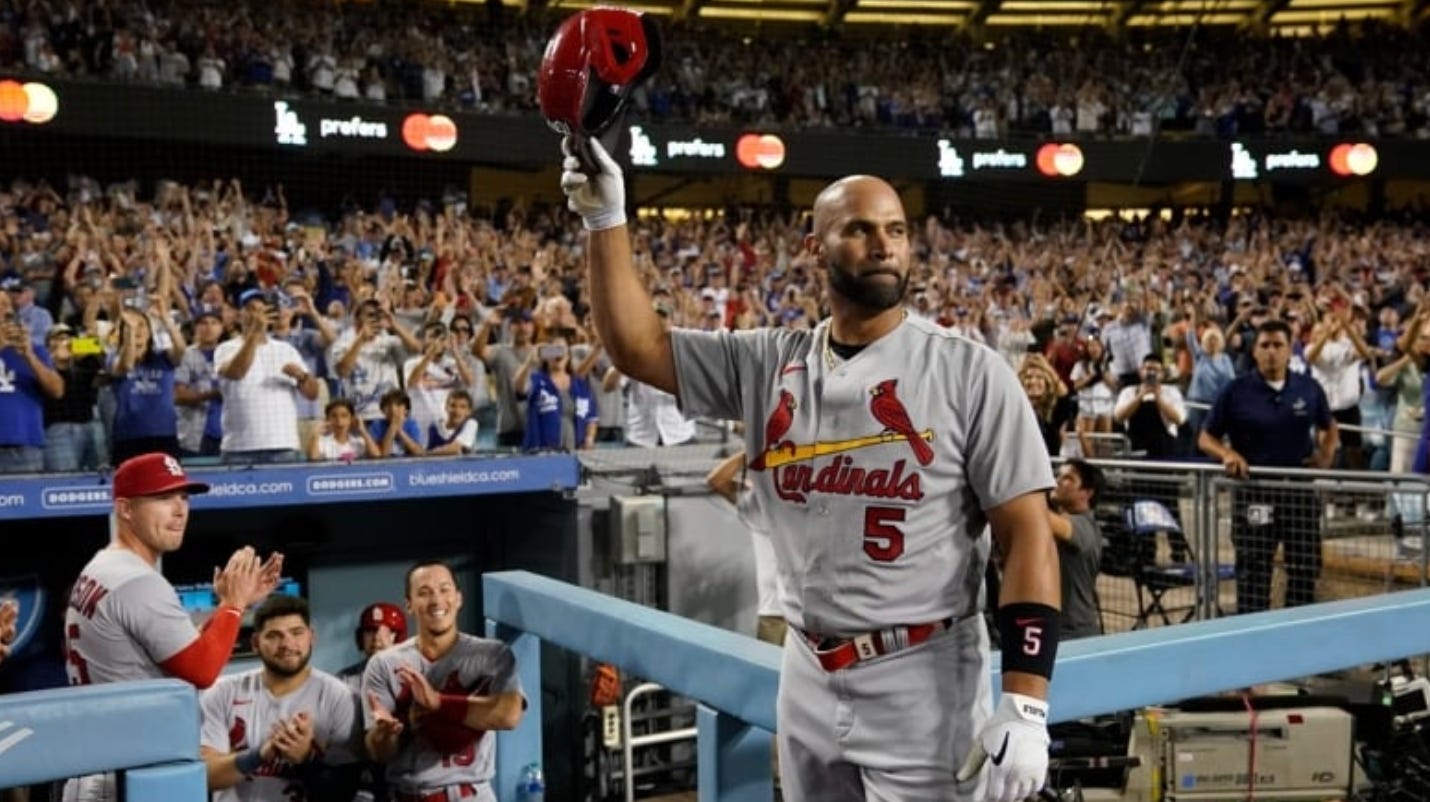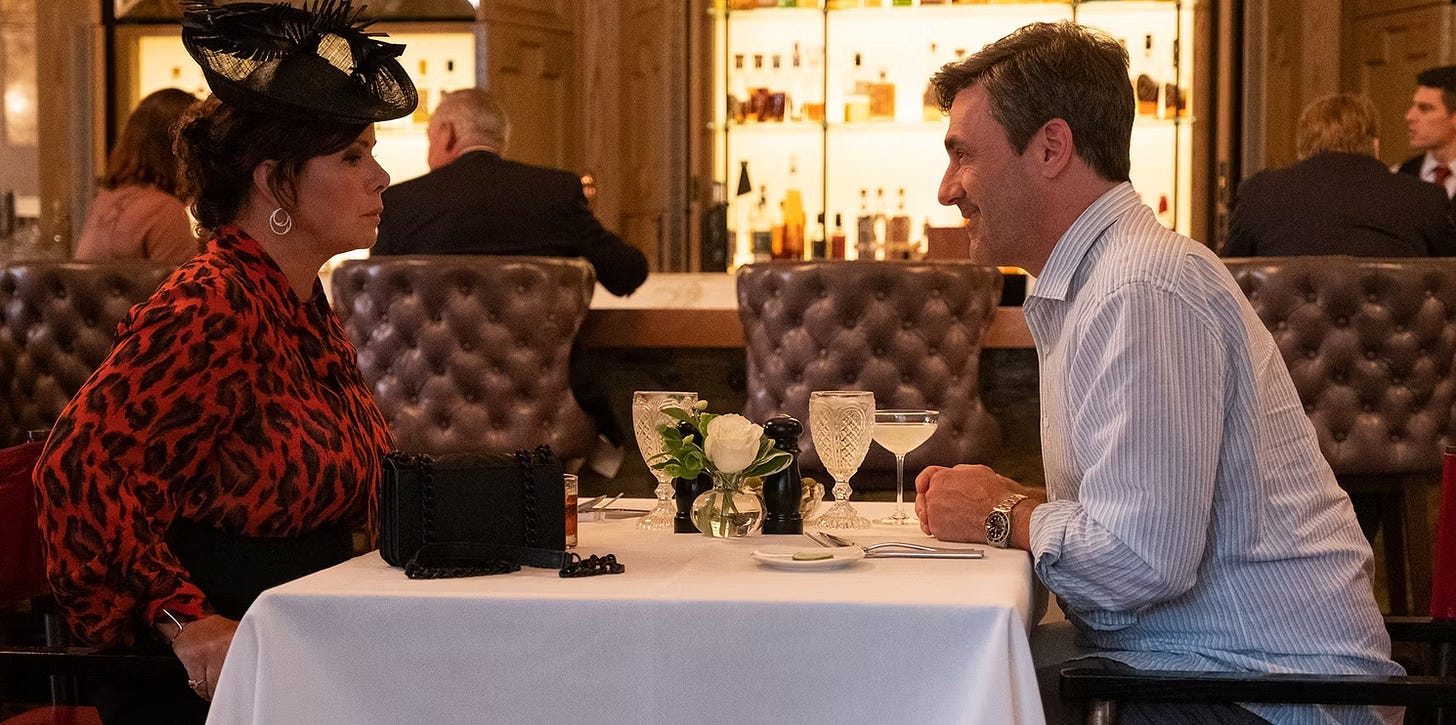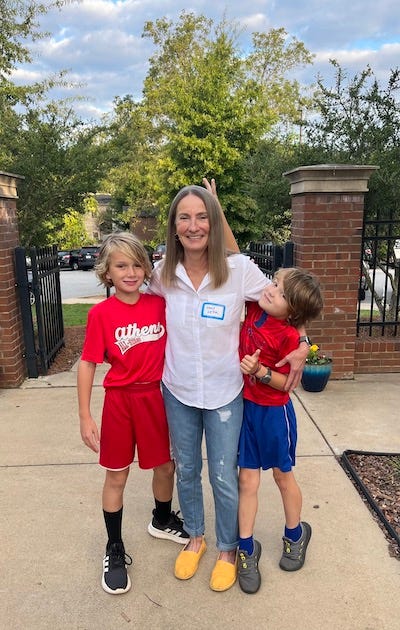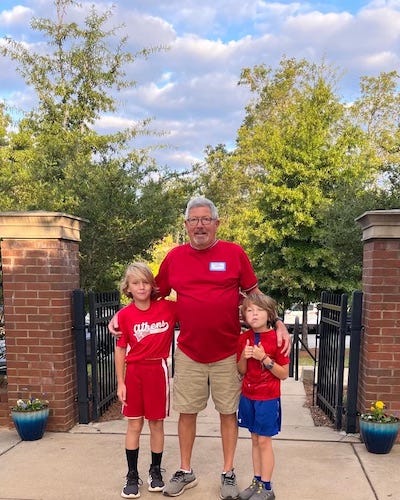Volume 4, Issue 35: Tired of Taking It Out on You
"I'm ashamed of who I am. I'm in pain, so I strive."
Here is a button where you can subscribe to this newsletter now, if you have not previously done so. I do hope that you enjoy it.
My younger son was involved in a skirmish at school this week. It doesn’t appear to have gotten out of hand: No one was hurt, a teacher was standing right there, the only real “punishment” was everyone who was standing near the “fight” had to sit in a semicircle the next day talking about their feelings. It seems to have been a playful playground rassling that got a little out of hand, and even if it had been more than that, we’re still talking about third graders here: It’s not exactly Raging Bull. There were a few mildly disturbing revelations to emerge in the wake of the incident—primarily my son, who is the smallest kid in his class, telling me that he never has to worry about getting hurt because the biggest kid in class is “my bodyguard” and “Dad, he will literally do whatever I tell him to, no matter what”—but on the whole, I’ll confess, it struck me mostly as the sort of roughhousing third grade boys have been doing since the beginning of time. But I’m not sure I’m right about that.
I’ve never been in a fight, not once, not in my entire life. I’ve never been thrown to the ground, I’ve never had a shoving match, I’ve never been punched in the face. I have never been particularly close, really. There has never been a time when a fight was clearly brewing and I ran away from it, or I had to appreciably turn the temperature down. I've not actively avoided a fight: It just hasn’t happened. What can I tell you? I’m an agreeable guy. For many years, though, I saw this as some sort of weakness in my character, some sort of rite of manhood passage that I was deficient in having pass me by. How much can you know about yourself if you've never been in a fight? Chuck Palahniuk famously wrote in Fight Club. There was a time I wondered if this statement might be true, that there as a part of my personality that I hadn’t accessed because I’d never been in a fight. I’m glad I don’t wonder that anymore.
Of course, when I think back on it, when I was the age my kids are now, there were fights constantly. There was a small park catty-corner to Columbia Elementary School in Mattoon, Illinois, with something called the “dredge,” where all the fights were. You’d hear the first rumblings at lunchtime: Eric and Jeff are gonna get in a fight, everybody meet at the dredge after school. You spent the rest of the afternoon handicapping the fight—Jeff’s going to stomp him, Eric is gonna get killed—and desperately hoping that neither kid chickened out, eager to see two kids have a fight, a real one. They usually petered out: A teacher would find out, or one kid’s mom would show up early, or you’d look up at 2 p.m. and Eric and Jeff were cool now, it’s fine.
But every once in a while you’d get a live one. The big one was Roger and Dave. Roger was huge, and he beat Dave down so severely that Dave lost several teeth; Dave lay there, face down on the asphalt, next to a rusted teeter-totter and a swing set with a broken chain, his shirt bloody, his chest heaving up and down, just bawling, as we all stared at him. He was in the fifth grade. I was 10 years old.
Middle school brought even more fights than that, but middle school fights were just part of the terrain; crowds usually didn’t gather for middle school fights, if you gathered for middle school fights, you’d never have time to do much of anything else. My older son is in the fifth grade this year and will be heading to middle school next year, which is causing all sorts of concerns for parents of his classmates about “all the fights.” On one hand, I find this a bit of an overreaction; as previously mentioned, middle school is awful everywhere and always has been, and the notion that this is something children could possibly be protected from strikes me as wishful thinking and, all told, probably not particularly helpful. When we were in middle school, fights were simply part of the landscape; today, middle school fights make the local news and spread wildly across social media. Fights seem like a bigger deal now because everything seems like a bigger deal; we live in an environment where, if you are not careful, your hair will constantly be on fire.
But then again: I’m not sure I’m right about that either. I think of either of my sons as poor Dave, my beautiful boys, lying in the park, bleeding, heaving, weeping, as their entire school looks on—like I did, like we all did—and I want to walk into the ocean.
The thing about fights is, well, they are bad. They hurt people. They are the enemy of reason; they are the collapse of discourse. They are where you go when you are too foolish, too immature, too inherently limited, to figure out anything else. I can look back on all the fights when I was a kid and think we are making too big of a deal out of them now, but I suspect that’s the exact wrong way to look at it: The problem is that we didn’t make enough of a big deal out of them back then. There are whole generations of humans—literally, centuries worth—who believe that fighting isn’t just a way to resolve their problems, but in fact the first resolution. I think you can see the results of this every day, and have been able to throughout most of human history.
It has been nearly five years since I wrote my cover story for New York magazine, How to Raise a Boy, an extended essay that attempted to wrestle with masculinity, privilege an aggression—healthy and otherwise. (The original title of the piece was “Raising Boys in the Age of Trump.”) I find myself, as the boys in this house approach puberty, thinking of this section:
For generations, boys have been raised in environments that seemed designed to cultivate, and then sublimate, aggression, sometimes right up to the border of sociopathy. (We recoil at Fight Club, but it basically depicts the secret life of boys aged 8 to 14. Men are Tyler Durden spliced with Beavis.) But those masculine scripts seem especially problematic today: Trained by superhero movies, inspired by planet-straddling athlete-gods and tech tycoons more powerful than entire governments, boys are reared to tame their aggressions, then asked to navigate a bleak, winner-take-all economic landscape. Thanks in part to more enlightened attitudes about gender and parenting, it is hard not to see male entitlement and aggression as toxic forces degrading our culture. But it is also hard not to notice that the world is now run by the aggressive and the bullying.
I’m not sure things have gotten much better in the nearly five years since I wrote that essay. (As one totally-tiny example, Roe v. Wade is no longer than law of the land.) Which I’d argue makes curbing that aggression—of recognizing that fighting is the last refuge of the witless and lost—even more important than it was back then. The temptation is to laugh about third graders scuffling, look at them, being silly little boys. But that’s how this starts, isn’t it—how it’s always started. My sons are about to enter the most confusing years of their lives, where the world suddenly seems so much larger and more terrifying, when they have so much to confront at the exact point they are least equipped to deal with any of it. This is the point when all of this starts getting very real. I still remember being that fifth grader, watching Dave lying on the ground, then scrambling with everybody else to get out of there before a teacher or somebody’s mom gets there. It is a vivid, active memory—I can even conjure the cloud cover in my mind. Which means the memories my kids are making now—whether they’re having a playground skirmish, playing a baseball game or just watching their father curse in traffic—will be just as vivid for them. We’re playing for keeps now. I’m not sure exactly what to do about it, what to say, what is right and what is wrong. But I’ve learned one thing from poor Dave: I’m not going to stand idly by and watch.
*********************
ALBERT
I’ve had a head cold all week—legitimately my first head cold in about four years—and I’ve been working roughly 13-hour days to finish up edits on the next book, so I was so exhausted Friday evening that I knew there was no way I’d make it through a 10:10 p.m. ET Cardinals start in Los Angeles. I watched the first inning and then slept the sleep of the dead. So of course I missed Albert Pujols’ 699th and 700th homers last night. I’ll be in St. Louis with my father for the final Busch Stadium games next weekend, so I won’t be lacking for Pujols/Yadier/(maybe) Wainwright goodbyes, but I’ll confess it’s a bummer that I slept through Pujols’ milestone, a bummer I’m trying to make up for by watching every highlight of the homer about 50 times this morning. What an incredible gift this year has been.
The great Derrick Goold wrote a terrific game story off last night that you should absolutely read.
Here is a numerical breakdown of all the things I wrote this week, in order of what I believe to be their quality.
Tom Brady Is Unhappy, New York. Every dog ends up not having his day, at least once.
Potential Wild-Card Matchups, Ranked, MLB.com. There are 15.
The Impossibility of Ever Being Shocked by a Trump Crime, Medium. I think I’m plum out of outrage.
What American’s Death Would Shut Down the Country’s Like the Queen’s? Medium. Probably no one’s.
The Thirty: Every Team’s Most Pleasant Surprise in 2022? MLB.com. Brendan Donovan forever.
PODCASTS
Grierson & Leitch, Grierson’s back from Toronto, we had a great time talking “The Woman King,” “Confess, Fletch,” “Pinocchio” and “Barbarian.”
Seeing Red, Bernie and I don’t take weeks off, even if the Cardinals do!
Waitin' Since Last Saturday, we previewed the Georgia-Kent State game and recapped the Georgia-South Carolina game.
LONG STORY YOU SHOULD READ THIS MORNING … OF THE WEEK
“Roger Federer As Religious Experience,” David Foster Wallace, The New York Times PLAY Magazine. Roger Federer’s retirement this week inspired me to look up this classic piece. I know David Foster Wallace is a little out of fashion these days, for not-entirely-wrong reasons, but this piece is forever incredible. I had a (smaller, much worse) piece in this very issue of this magazine, which has always made me proud.
ONGOING LETTER-WRITING PROJECT!
This is your reminder that if you write me a letter and put it in the mail, I will respond to it with a letter of my own, and send that letter right to you! It really happens! Hundreds of satisfied customers!
Write me at:
Will Leitch
P.O. Box 48
Athens GA 30603
CURRENTLY LISTENING TO
“Helpless,” Sugar. Seeing Bob Mould next month—assuming it doesn’t conflict with a Cardinals NLDS game—and have been going through the full catalog. Shoutout to the great David Barbe, who not only was in Sugar but also is a champion baseball coach in the Athens Little League. (And has been incredibly helpful on certain sections of the next book, for what it’s worth.)
Remember to listen to The Official Will Leitch Newsletter Spotify Playlist, featuring every song ever mentioned in this section.
They had Grandparents Day at the boys’ school the other day, and my parents not only went, my dad wore his shirt backwards like my son Wynn does every day, which was a fantastic touch. No one had to question whose grandpa he was.
Have a great weekend, all.
Best,
Will









If the Cardinals aren't in the NLDS that night -- and sorry, Mr. Mould, but I hope they are -- I'm going to have a blast.
This Bob Mould tour has been fantastic. Enjoy.